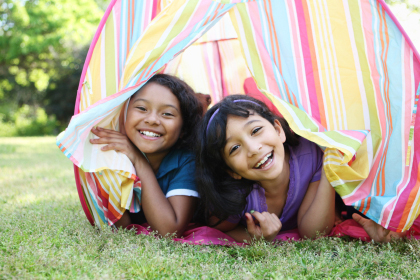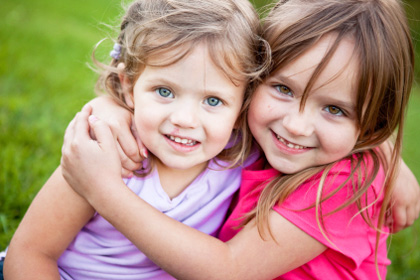
Turn on the television to nearly any channel to witness reality stars flipping tables, and pundits cursing and yelling. In families, fights happen — between siblings, partners, and parents and kids. Terrible TV is a good reminder of why it’s important to teach children how to fight fairly in a healthy and productive manner.
And parents should begin by looking in the mirror, experts say.
“Parents and adults have to take ownership,” says Laura Doerflinger Schneider, a Kirkland-based family counselor. “The way parents problem-solve, negotiate and argue will be the same way their kids fight. Kids behave, react and respond based on what they’ve learned.”
Problem-solving skills can improve everything from sibling and peer relationships to school performance. Down the road, it potentially translates into healthier marriages and careers.
Step in or stay on the sidelines?
For Cindy Bovey’s 10-year-old son, Aiden, the soccer field became the breeding ground for disagreements. At home, typical sibling arguments about toys erupted with Grace, his 7-year-old sister.
Two years ago, Aiden enrolled in weekly classes through Casey’s Clubhouse. Founded by Doerflinger Schneider and Leslie Fields, both licensed mental health counselors (LMHC), the independent, Kirkland-based program teaches problem-solving and social skills to first- through eighth-graders.
“I used to step in so quickly because I didn’t want to see the kids fighting,” Bovey, a Newcastle resident, explains. “I’ve learned through Casey’s Clubhouse that it’s OK to step back and wait. Let the kids try to handle it themselves until they ask for help or it’s clearly needed.”
 According to Liliana Lengua, Ph.D., a child psychologist and professor of psychology at the University of Washington, adults tend to respond in one of three ways when addressing children’s conflicts: They immediately end the argument; they jump in and solve it; or they ignore the situation altogether. Instead, the ideal approach is to equip children with the needed skills to effectively handle it themselves.
According to Liliana Lengua, Ph.D., a child psychologist and professor of psychology at the University of Washington, adults tend to respond in one of three ways when addressing children’s conflicts: They immediately end the argument; they jump in and solve it; or they ignore the situation altogether. Instead, the ideal approach is to equip children with the needed skills to effectively handle it themselves.
“The adult’s role is more like a coach on the sidelines. Offer advice, perspective and help them see the steps they could be taking,” Lengua says. “If it’s a low-level conflict, let them navigate the situation without too much intervention.”
Bovey now identifies potentially problematic situations in advance. She and Aiden discuss expectations and prepare ahead of time for playdates and soccer games.
“It’s so awesome. It’s really helped him, and I’ve particularly noticed in the past year how much better he is at de-escalating situations with his sister. He’s learned skills so he can handle it better on his own,” Bovey says.
Take a breath
It’s a sibling tradition to argue over personal possessions. In the Lubkowski household, books are prized possessions that sometimes spark disagreements.
“They have to keep it fair, no name-calling or physical disagreements. Those are basic rules,” says Ballard resident Kelly Lubkowski, mom to a 13-year-old son and 10-year-old daughter. “We usually wait until everyone cools off — leave the room if necessary — to talk it through.”
They deserve respect. They should have the right to express their emotions, thoughts and even to disagree.
Experts agree. When tempers flare, the fight-or-flight instinct kicks in, and it’s challenging to respond rationally. Take a breath. A minor incident may only require counting to 10, whereas an escalating incident might mean physically removing oneself.
“Instead of designating a ‘time-out’ so it feels like a punishment, have a calm corner that’s recognized as a settled space,” Doerflinger Schneider advises. During a parent-child conflict, “If the child has to go to their room to calm down, then the adult should go to their room, too.”
Authority figures and children inhabit different roles and are not necessarily equals. However, don’t dismiss a child’s concerns or feelings because they seem trivial from an adult perspective.
“They deserve respect,” Doerflinger Schneider says. “They should have the right to express their emotions, thoughts and even to disagree.”
Express yourself
There is an intuitive element to some social skills, but many are actually learned. All of them can be developed and honed.
“Not everyone is wired to be naturally empathetic, but it’s something you can actually teach the brain,” says Susan Tomlinson Gorman, founder and director of New Discovery School (NDS), a Seattle-based preschool celebrating its 30th year.
The school uses the Second Step program, which focuses on conflict management. Children are taught to identify emotions in themselves and others, which fosters a sense of empathy.
“Empathy is the next step in arguing effectively,” Lengua says. “In addition to teaching kids ‘I’ statements [stating one’s feelings rather than making accusations], encourage children to also make empathetic statements, such as, ‘You might be feeling frustrated, too.’ Keeping that in mind, then work to find a compromise.”

According to Lengua, children as young as 2 have the developmental capacity to begin learning such skills. Begin by teaching vocabulary to articulate and communicate emotions. Role-playing is particularly effective.
Starting young can help students begin school on a positive note. Better conflict-resolution skills help children focus on academics. Gorman hears from teachers and parents that NDS youngsters entering kindergarten are more confident, less distracted and better able to cope with new situations.
“As teens, they deal with more complex situations. If they already know basics, it’s easier to develop more nuanced skills,” Lengua says.
Family dynamics
Fighting fairly should be the same whether dealing with siblings or peers. Children tend to take the gloves off more often in family situations.
Some amount of sibling discord is to be expected, but it still should be addressed and taken seriously. Lengua and Doerflinger Schneider advise framing the conversation by asking a child whether they would behave the same way with a peer. If not, why?
“Sibling conflict can really escalate and turn aggressive to the point of bullying. In my opinion, there are definitely consequences in the long run if it’s not addressed. Catch it when it’s at a low level,” Lengua advises.
The time will come when even adults lose their cool and mishandle an argument. Seize the opportunity to teach the final step in fighting fairly — reparations.
“Model the ability to apologize. Acknowledge that you didn’t handle the situation well and said something hurtful rather than helpful. Talk about better approaches,” Lengua recommends. “Actually, if parents always do things perfectly, kids don’t master skills as well. Show them how to cope with less-than-optimal responses.”











